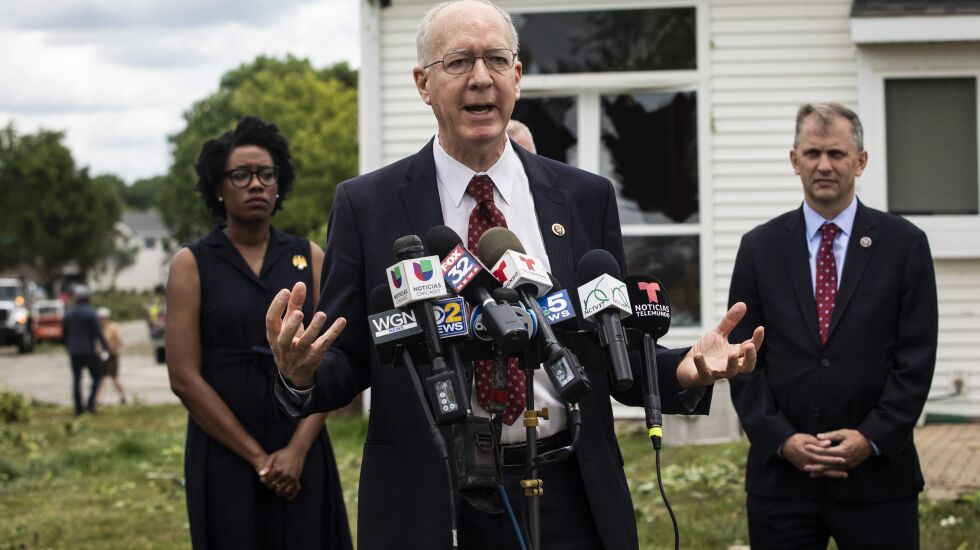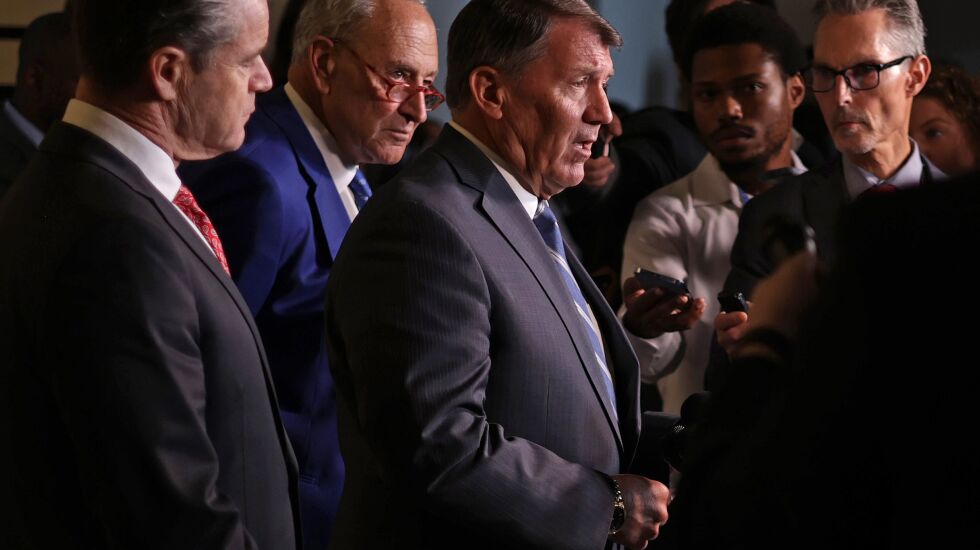
U.S. Rep. Bill Foster is taking a hands-on approach to testing artificial intelligence.
As the only member of Congress with a doctorate in physics, he’s using AI software frequently in hopes of learning more about an emerging field that fascinates the medical and science world and terrifies many others, including some in the federal government.
“I do a little bit of it just to make sure I haven’t lost all of my technical neurons,” Foster, a former physicist at Fermilab and an Aurora Democrat, said in an interview. “What I do is that I have a handful of sort of small-scale projects, and I download the latest version of TensorFlow, Google’s AI product, and then I apply it to a problem that I’m interested in.”
Foster calls it a “hobby” that’s helping him get Congress up to speed on the burgeoning technology. He’s not the only lawmaker trying out AI, especially ChatGPT, which can generate human-like text based on past conversations.
“I have a friend who’s a member of Congress who needed a graduation speech — ‘I want a 10-minute commencement speech, the challenges of leadership in the era of rapid technological change,’ took it to ChatGPT,” Foster said, declining to name the friend. “And he said he got a first draft that was at least as good as he could. And then he ended up using it.”
Congress weighing what to do
Foster is among a small group of House members who have met with House Speaker Kevin McCarthy in a working group on AI policy. The latest meeting, in June, included U.S. Rep. Jay Obernolte, R-Calif., who has a degree in electrical and computer engineering, U.S. Rep. Don Beyer, D-Va., and U.S. Rep. Ro Khanna, D-Calif.
There also has been talk of sending a Congressional delegation to Silicon Valley or the Boston area to gain insight into AI, according to a source familiar with the discussions.
Talk in the House of Representatives on AI hasn’t progressed as far as it has in the Senate. But there’s a general consensus that both chambers of Congress want to do something visible, given how prevalent AI is and how concerned many people are about the technology’s impact.

A week ago, more than 20 tech CEOs, civil rights advocates and consumer advocates took part in the Senate’s Artificial Intelligence Insight Forum, at which there appeared to be no agreement on what AI policy Congress should enact.
AI legislation is on hold as lawmakers wrangle over a spending plan that must be passed to avoid a shutdown of the federal government.
Foster said he is deeply concerned about AI’s ability to create deep-fake impersonations.
AI can allow for family members’ voices and images to be cloned and used to perpetrate financial fraud. Criminals have used the technology to scrape photos and videos off social media to impersonate people in FaceTime calls. People have been duped by the faked voice of a family member, in some cases a grandparent, begging for money.
“It’s a short-term emergency,” Foster said. “There’s going to be a wail of pain from the American public when they’re confronted by these because they’re computer-generated, and they will happen at scale.”
Proving you’re not a robot
Foster wants Congress to enact a way for people to confirm that the person they are communicating with via cellphone or other electronic communication isn’t a robot. That could include the use of a mobile ID or digital driver’s license to link information to a phone.
“This allows anyone to verify that, yes, this is the cellphone that is associated with your REAL ID driver’s license, so that they know for sure that whoever it is that’s contacting them is in possession of the cellphone that is associated with that digital driver’s license,” Foster said. “So it’s a very powerful combination that allows you to prove with pretty good certainty that you are [a] legally traceable person if you’re requested to do that.”
Illinois Secretary of State Alexi Giannoulias has pushed for the creation of a digital driver’s license, but state lawmakers haven’t acted on the proposal.
Foster said he’s also concerned about some unscientific aspects of AI, including its ability to disrupt the workforce in the fields of art and design, among other creative industries.
“What does it mean to be trained as an architect in a world where a lot of what you do can be done, at least as well as, [by] a piece of software?” Foster said. “And the worry that people have is that this is going to break the link between hard work and talent and economic success… I’m trying to understand how people retain their value as human beings.”
‘Chaos in the political arena’
Gov. J.B. Pritzker also is keeping tabs on AI. Earlier this year, he signed legislation that creates an AI Task Force. Made up of legislators, technology experts, educators and others, the task force will provide AI policy recommendations to the Illinois General Assembly, with a focus on schools, civil liberties and the economy.
The state already has a law requiring employers to get consent before using AI in hiring.
Pritzker said AI has the potential to create “huge opportunities,” but he also said he worries that foreign entities could use AI to blackmail government officials and private citizens with false information — using the same deep-fake technology that worries Foster.
The governor, who spent millions of dollars on TV ads last year to win reelection against Republican Darren Bailey, said he’s concerned about deep fakes in political advertising, too. He predicts the use of AI in campaign ads will wreak havoc.
“It’s nearly impossible to tell the difference between something that’s AI-generated now and something that’s real, and it takes days,” Pritzker said. “Someone’s reputation can be ruined in about two hours, as you know. And so, if it takes days to uncover that, ‘Oh, this thing is true,’ and it’s easy for people to put that stuff out there, then we’re really going to have chaos in the political arena.”







